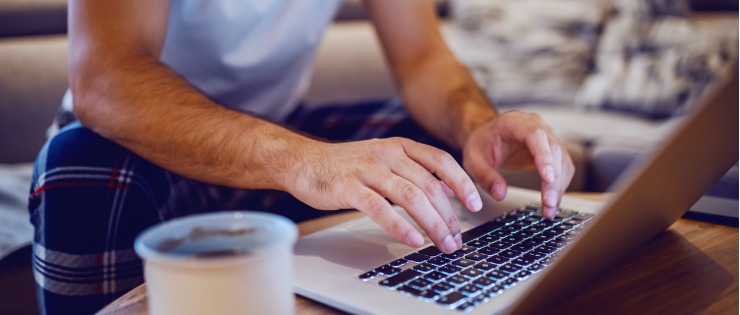
Thousands of Australians work from home every day while thousands did for the first time to help flatten the COVID-19 curve. Not leaving the house to work and socialise keeps us safe from circulating viruses, but it can put us at risk of other dangerous health conditions, both physical and mental. Some people relish the time not spent commuting to spend with family or complete projects around the house. But many struggle.
Here are eight tips you can use to help stay mentally healthy while working from home.
#1 Change Out of Your PJ’s Every Day
Just because you can stay in your pyjamas all day without the risk of anyone seeing you doesn’t mean you should!
Have a shower and get dressed as if you were leaving the house. Getting dressed into day clothes gives you a mental boost. There’s a theory known as enclothed cognition. It means the clothes we wear can influence the way we feel and behave. By dressing in clothes close to what you wear to work, you’re more likely to be in a work mindset. Sitting in your pyjamas may not allow your brain to tick over into work mode.

So rather than debating with yourself on why bother getting dressed when no one will see you, think of how much better you may feel if you shower and brush your hair. If you apply make-up before heading into the office, continue while you work from home to help you adopt a work mindset.
#2 Keep Your Morning Routine Going
If you used to get up at 6.30am to commute to work, continue getting up at the same time. Staying up later than you would to binge on Netflix then rolling out of bed a minute before you begin work isn’t ideal. Getting enough sleep is important for good mental and physical health. Just because you aren’t fronting up to work, doesn’t mean you won’t feel sluggish and unproductive during the day if you’re sleeping in.
As winter sets in it will be even more enticing to forget the alarm clock and snooze through what could be the most productive part of your day. Use the time you used to commute to go for a walk or do a few chores around the house.
#3 Keep Some Separation Between Work and Home
When you’re used to travelling to your workplace, it’s easier to have some separation between your work and home life. During the commute home, you could stop thinking about work and let your stress levels reduce. But with the commute now gone, it’s much easier to let work stress continue long after you’ve clocked off for the day.
For many Australians, their work life is more stressful than it’s ever been. They might be dealing with greater workloads or the threat of job loss. Try to keep some kind of separation by closing the study door on your work at the end of the day. If you don’t have a separate room to work in and you’re using the dining table, try to pack up your work as a signal to your brain that the work day has finished. Leaving the house for a walk or trip to the shops can also help separate your work and personal life.
#4 Stay in Face to Face Contact
Just because your calendar is void of work meetings, doesn’t mean you should stop seeing your colleagues. If you aren’t meeting over Skype or Zoom, suggest a meeting to discuss a project or even a social catch up call on Friday afternoon.

A video call rather than a phone call might be the encouragement you need to make yourself look presentable. Keeping up your personal presentation standards can help you feel better than living in your tracksuit. There’s no need to dress up to the extent of Julie Bishop, but smart casual or your usual work clothes can help.
#5 Get Out for Some Exercise & Fresh Air
Working from home often means missing out on incidental exercise. You aren’t walking to the bus stop or from your car to the train station and then the office. Rather than walking to get a coffee or your lunch in the city, it’s now only a few steps away in your kitchen.
Don’t let working from home be the reason you pile on the unwanted kilos. Go outside in the fresh air and quiet streets to help clear your mind. Walk the dog or ride your bike for at least half an hour per day to reduce the risks of a sedentary life.
If you have a bush track close to home, go for a walk or jog there. Research shows spending time in nature reduces stress, anxiety and depression. If you’re living in a built up area, take a drive to the beach or bush to get in touch with the natural environment.

#6 Upgrade Your Workspace
Even if you never got around to folding the contents of your wardrobe as Marie Kondo suggested, you could consider her advice on your workspace.
The queen of declutter suggests going through the pile of papers and unread magazines that could add to the distractions. A clean work space helps some people work with a clearer mind.
If you’re missing your work station, buy yourself something for the area you now call your work station. It could be an indoor plant, crystals, some pretty stationery or a colourful print.
Make sure your new work station has the right equipment. A musculoskeletal injury from sitting on a dining chair can take its toll on you physically, but a long rehabilitation can cause havoc with your mental health.
#7 Healthy Eating
When you’re spending so much time at home, you’re never far from the pantry and fridge. And it’s likely you can’t resist the temptation to help yourself more than you would if you were at work. Now you can eat what you like without judgement from your colleagues!
Try to resist the urge to binge on junk. Foods high in sugar and salt not only add centimetres to your hips but can leave you feeling sluggish and unmotivated, even depressed. Limit the temptation by not keeping junk food in the house.
In recent years, there has been more research on the gut-brain axis and nutritional psychiatry. A healthy diet can affect mental health. While diet isn’t the panacea for low mood and depression, researchers have found it can help. One study concluded there were 12 antidepressant nutrients found to prevent and treat depression. Foods containing the nutrients include:
- Mussels
- Oysters
- Salmon
- Spinach
- Romaine lettuce
- Cauliflower
- Strawberries

Even if you aren’t a fan of these foods, stocking the fridge with ingredients to prepare healthy meals and snacks can help. Try keeping fruit, vegetables, nuts and seeds on hand rather than processed and ultra-processed foods. If you’re in the baking mood, skip the brownie and make some energy balls or a healthy slice instead.
#8 Work in Sprints
Working from home can be hard because there are far more distractions than at work. There’s washing to hang out, the fridge to clean, and the dog to play with.
If you want to be productive you may need to use a different time management technique than the one you used in the office. The Pomodoro Technique has been popular for years. It requires that you focus on work solely for 25 minutes. Once the timer goes off and the sprint is over, you hop up from your chair to give yourself a short five minute break to rest before you refocus on the next sprint.
Ask for Help If You Need It
If you find your mental health isn’t what it was prior to working from home, you’re not alone. Soon after self-isolation measures were introduced, the Federal government committed $1.1 billion to support more mental health and domestic violence services. Whatever your living and work arrangements, everyone is at risk of poor mental health outcomes with more time spent at home.
Don’t assume your mental health will improve on its own, reach out for help now. The longer you leave it, the more difficult it can be to turn around. Some workplaces provide staff with access to an Employee Assistance Program which includes confidential counselling services. GPs and psychologists are available to help or call Beyond Blue on 1300 22 4636.